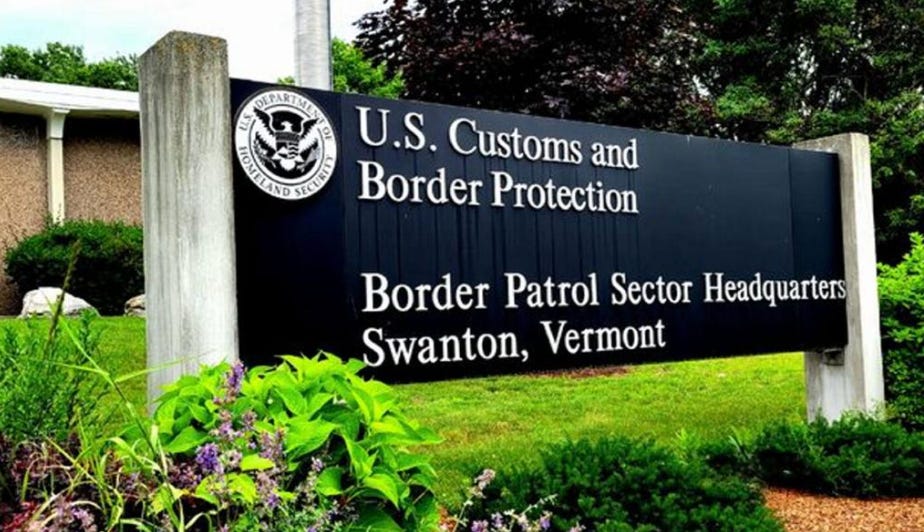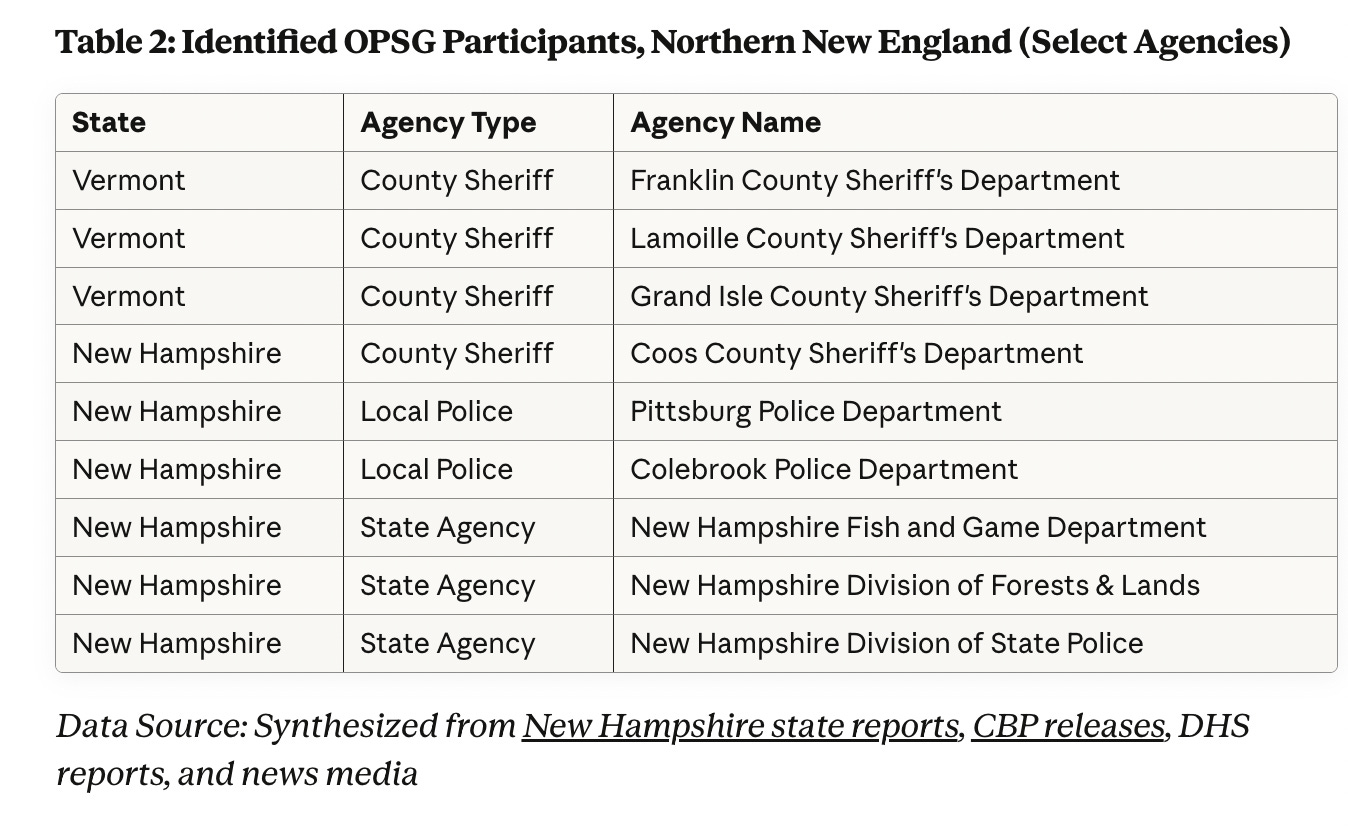Despite New Law, Vermont Police Get More DHS Cash Than Ever for Immigration-Aided Patrols
The funding flows from the federal government to Vermont’s Department of Public Safety, which then distributes it to local agencies, who then conducts patrols coordinated with the U.S. Border Patrol.
In 2025, Vermont lawmakers thought they had closed the door on local police cooperation with federal immigration enforcement. They passed a new law requiring legislative approval before any Vermont law enforcement agency could enter formal agreements with federal immigration authorities.
But a close examination of the law reveals a significant gap: it does nothing to stop Vermont agencies from accepting hundreds of thousands of federal dollars through a grant program called Operation Stonegarden—a program that funds the very same cooperation lawmakers sought to prevent.
What Is Operation Stonegarden?
Operation Stonegarden (OPSG) is a federal grant program administered by the Federal Emergency Management Agency (FEMA) and operationally managed by U.S. Customs and Border Protection (CBP). The program provides funding to state, local, and county law enforcement agencies for “joint efforts” to secure U.S. borders.
The money primarily pays for police overtime, vehicle costs, and equipment. In Vermont, this has meant a steady flow of federal dollars: $500,000 in fiscal year 2022, $800,000 in 2023, and $760,000 in 2024, according to a Department of Homeland Security report to Congress.
Vermont agencies that have participated include the Franklin County Sheriff’s Department, Lamoille County Sheriff’s Department, and Grand Isle County Sheriff’s Department.
How the Program Works
The funding flows from the federal government to Vermont’s Department of Public Safety, which then distributes it to local agencies. Once an agency receives the money, it conducts patrols coordinated with the U.S. Border Patrol.
Lamoille County Sheriff Roger Marcoux, a past president of the Vermont Sheriffs’ Association, has described Operation Stonegarden as a “secondary income stream to local officers and deputies.” A Border Patrol agent explained the arrangement simply: “We will pay overtime for county and local department officers to come help us patrol the border.”
Data Source: DHS Operation Stonegarden Report: Fiscal Year 2024 Report to Congress
Who Participates in New England?
The program’s reach extends beyond traditional police departments to include conservation and natural resource agencies.
Why Vermont Became a Focus
The northern border has seen dramatic changes in recent years. The U.S. Border Patrol’s Swanton Sector, which covers all of Vermont and parts of New Hampshire and New York, recorded 19,385 encounters in 2024—82% of all encounters along the entire U.S.-Canada border.
CBP has cited these “changing migration trends” as justification for expanded enforcement in the region, including increased use of programs like Operation Stonegarden.
Federal Oversight Concerns
The program has faced scrutiny from the federal government’s own watchdog agency. In November 2017, the Department of Homeland Security Office of Inspector General issued a report concluding that FEMA and CBP had “not collected reliable program data or developed measures to demonstrate program performance.”
The inspector general found the agencies were “unable to support that the more than $531.5 million awarded for Stonegarden to date is justified.” The report also found that more than $14.6 million in overtime costs were approved without addressing the risk of “supplantation”—the illegal use of federal funds to pay for routine local activities that should be funded by local budgets.
The Link to Immigration Enforcement
A critical and often-overlooked detail is that FEMA’s official funding documents explicitly connect Operation Stonegarden to the controversial 287(g) program, which formally deputizes local police officers to act as federal immigration agents.
The FY 2025 funding guidance for Operation Stonegarden states that funds can be used to:
“Provide staffing support to expand 287(g) screening operations within correctional facilities”
Pay for “Operational overtime costs directly tied to 287(g) screening, processing, and enforcement activities”
Fund “Training programs for state and local law enforcement officers in immigration law, civil rights protections, and 287(g) procedures”
Vermont’s Attorney General has confirmed that no Vermont agency has ever entered into a 287(g) agreement, and state policy discourages local participation in federal immigration enforcement. However, the federal government uses Operation Stonegarden funding to encourage exactly these activities.
Civil Rights Challenges
Civil liberties organizations have raised concerns about Operation Stonegarden’s impact on constitutional rights and community trust.
The ACLU affiliates in Vermont, New Hampshire, and Maine filed a federal lawsuit challenging Border Patrol checkpoints in New England, which the lawsuit alleged were used “nearly 100 miles from the border, as a ruse to unlawfully search and seize people for the purpose of general crime control.”
In May 2023, CBP agreed to a settlement halting its checkpoint on Interstate 93 in Woodstock, New Hampshire, until at least January 1, 2025.
A related 2018 state court ruling in New Hampshire found that a checkpoint’s “primary purpose” was drug detection, not immigration enforcement, making it “unconstitutional under both State and federal law.”
Migrant Justice, a Vermont-based immigrant advocacy organization, has documented what it describes as “unprecedented levels” of immigration enforcement activity in Vermont, including raids on dairy farms and traffic stops leading to detention. The organization argues this creates “widespread fear” in immigrant communities.
Vermont’s 2025 Legislative Response
Responding to these concerns, the Vermont legislature in 2025 passed S.44, which became Act 28.
The law requires that the Governor or any state, county, or municipal law enforcement agency “shall not enter into an agreement pursuant to 8 U.S.C. § 1357(g) or 19 U.S.C. § 1401(i) without prior approval from the General Assembly.” The first statute reference is the legal authority for the 287(g) program.
The ACLU of Vermont, which advocated for the bill, celebrated its passage for closing a “loophole which could have allowed rogue law enforcement agencies to begin working with federal immigration authorities.”
The Loophole That Remains
Despite the new law’s intent, Act 28 has a significant limitation: it only addresses formal 287(g) agreements. It says nothing about Operation Stonegarden.
The law’s text is laser-focused on preventing Vermont agencies from entering into formal agreements under specific federal statutes. Operation Stonegarden is authorized under different statutes and is administered as a grant program, not an agreement requiring deputization.
This means that even after Act 28 became law, Vermont sheriffs can still:
Apply for and accept Operation Stonegarden grant money through the Vermont Department of Public Safety
Use that money to pay deputies overtime to conduct patrols with U.S. Border Patrol
Participate in “joint efforts” with federal agents that may result in immigration-related stops and referrals
Because Operation Stonegarden does not require a formal 287(g) Memorandum of Agreement, it falls entirely outside the scope of Act 28’s restrictions.
Vermont Attorney General guidance has made clear that local police have no inherent authority to enforce federal civil immigration law. However, when a sheriff’s deputy on an Operation Stonegarden-funded patrol encounters someone they suspect of immigration violations, they can—and according to 2018 reporting, do—contact Border Patrol. As one Lamoille County Sheriff stated: “If they entered the country illegally, I’ll contact Border Patrol.”
The Constitutional Context
Operation Stonegarden patrols occur within the “100-mile border zone,” an area where federal regulations grant CBP authority to conduct stops and searches within 100 air miles of any border.
Because Vermont is entirely within 100 miles of the Canadian border, the entire state falls within this zone. Civil rights organizations argue this creates a “quasi-constitutional zone” where Fourth Amendment protections against unreasonable searches and seizures are weakened.
This geographic reality, combined with federal funding that incentivizes enforcement activity, places Vermont communities in a unique position regarding federal immigration enforcement.
Community Impact Concerns
Critics of the program argue it undermines trust between police and immigrant communities. An extensive ACLU survey of law enforcement officials, judges, and advocates found that fear of immigration enforcement prevents immigrants from reporting crimes—including domestic violence, human trafficking, and sexual assault—and from participating in the justice system.
Some Vermont police chiefs have declined to participate in Operation Stonegarden, citing these trust concerns. However, county sheriffs, who are elected officials with independent authority, have continued to accept the funding.
What Happens Next
The future of Operation Stonegarden in Vermont remains uncertain and depends on multiple factors:
At the Federal Level: Congress continues to appropriate funding for the program annually. The fiscal year 2024 and 2025 budgets each allocated $81 million nationally for Operation Stonegarden. How Congress funds the program in future years will directly affect Vermont allocations.
At the State Level: Vermont’s legislature could attempt to address the Operation Stonegarden loophole through new legislation. This would require crafting language that restricts state agencies from distributing federal grant funds for specific purposes, or that prohibits local agencies from accepting such funds—a more complex legal challenge than blocking formal agreements.
At the Local Level: Individual county sheriffs and police departments make their own decisions about accepting Operation Stonegarden funding. Because sheriffs are elected officials, voters in Franklin, Lamoille, and Grand Isle counties have direct influence over their participation in the program.
Through Litigation: The 2023 settlement that halted the New Hampshire checkpoint expires January 1, 2025. Whether CBP resumes checkpoint operations, and whether such operations face new legal challenges, could affect how Operation Stonegarden functions in the region.
Through Federal Oversight: The Department of Homeland Security Office of Inspector General continues to monitor the program. A June 2025 report indicates that FEMA has implemented new reporting requirements, including a “Daily Activity Report” that tracks arrests and seizures by Operation Stonegarden participants. Whether these reforms address earlier oversight failures remains to be seen.
The fundamental tension remains: Vermont has expressed, through its Attorney General’s guidance and its 2025 legislation, a policy preference against local participation in federal immigration enforcement. However, the federal government continues to offer financial incentives for exactly that cooperation—and state law currently does nothing to restrict it.
Whether Vermont lawmakers choose to address this gap, and whether they have the legal authority to do so without conflicting with federal supremacy in immigration matters, are questions that may define the next chapter of this issue.





